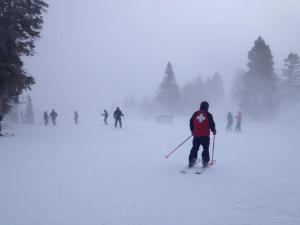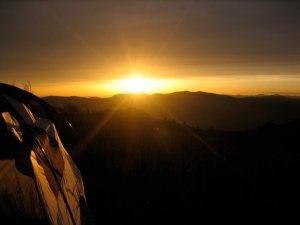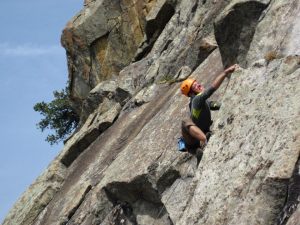The following is a question and answer type interview with Darran Wells, M.A. Assistant Professor Outdoor Education and Leadership, Central Wyoming College and long time NOLS instructor.
Q: What brought you in to the outdoor education industry? When did your passion turn into a career?

Darran Wells, Assistant Professor of Outdoor Education and Leadership.
I became interested in the outdoors through mountain biking and distance running with my father while I was in high school. We also took annual trips to Colorado to ski in the winter. The first time I went up to the mountains in the Summer, I knew that was where I wanted to be.
It wasn’t until after college, when I was a Peace Corps volunteer living in central Africa, that I learned about NOLS and started thinking about a career as an outdoor professional. Some other PCV’s I met in Africa told me about the NOLS branch in Kenya. The more I looked into NOLS after my Peace Corps tour, the more I was sure I wanted to work there.
Q: What opportunities are in the job market today for outdoor educators that may not have previously existed or been as prevalent? Which areas of the industry are growing the most and shrinking the most?
Stats show that more traditional outdoor activities like hunting and fishing have been shrinking a bit over the last decade. There are a number of emerging outdoor activities that are seeing a lot of growth—Stand up Paddleboarding, Adventure and Obstacle racing, Kite surfing and kite skiing, snow biking, backcountry skiing and snowboarding, etc.
Outdoor organizations and programs which are nimble and well funded have been able to adapt these new activities as they have grown in popularity.
There continues to be a lot of growth in programs which can be run close to large urban centers. These usually involve artificial environments like climbing walls and human-made whitewater parks or ice parks.
Jobs in academia, either as faculty or recreation staff, have been steadily growing over the last decade as colleges and universities recognize the value of experiential and co-curricular education.
Q: Which categories of jobs (counselor, naturalist, guide, etc.) might be the most profitable places to begin searching for someone wishing to turn their outdoor passion into a career?
The harsh reality is that no outdoor jobs really pay as well as we might like. It is truly a lifestyle choice to work in the outdoors. As you might guess, the best paying jobs in the industry involve running large organizations that make outdoor equipment or provide education or recreation opportunities. But those higher-paying jobs usually to not get to spend as much time in the field.
The best paying jobs which do involve time in the field usually cater to higher end clients, like up-scale adventure tourism or resort guiding. There is also potential for good money in outdoor film-making.
Q: If you could prescribe a recipe for going from “zero-to-hero” to aspiring outdoor educators, what would that process entail for someone looking to move up the ladder in the industry?
It seems hard for me to get this point across to some aspiring outdoor professionals, but I’ll try again here…the most important thing you can do for your career is identify what you LOVE to do. Whether it’s teaching, guiding, or
something else, if you don’t love it, you won’t last. So many young people with or without college degrees just bounce from job to job to job throughout their 20’s. That is fine, but it means that it will take you longer to reach your niche, that place where you are really self-actualized and happy with your work. If you can spend some serious reflection time trying to identify that thing you love to do while you are younger, you will have more time to become the master of your field.
What gets people from zero to hero is their love of the work they are doing. If you are passionate about it, you will gravitate toward the best mentors in your field and you will eventually become a master yourself. If the passion for your work isn’t there, you might as well be on Wall Street making real money because you are going to need it to be happy.
The recipe goes like this: 1) Find that thing you love to do; 2) Identify the person or organization who is currently doing that thing the best in the world; 3) Go to them and offer to start at the bottom of the ladder. Don’t take no for an answer. If they require a degree or certification, go get it. 4) Have fun while working your ass off as you move through the organization.
If running a business is part of your passion, then you may be better off leaving and starting your own at some point. But don’t own your own business just because you think that is what success is. You will never be happy running an outdoor business unless you like the everyday work of running a business more than you like actually being outdoors.
Q: In your opinion, which certifications are the most valuable for an outdoor education job applicant? Which certifications might not be worth an aspiring outdoor educator’s time and money?
Wilderness First Responder certification has become an industry standard for any programs which run overnight wilderness trips or visit remote locations.
Today, there are so many certifications out there for the various outdoor activities you might participate in that it is nearly impossible to sort them all out. Certifying bodies include: ACA for boating, AMGA for climbing, AIARE for avalanche education, NOLS Wilderness Medicine Institute and SOLO for wilderness medicine training, PADI for diving, etc. etc. Which of these certifications you choose to pursue depends on what skills you are interested in. My best advice here is to simply avoid the start-ups. If you are looking for a certification, you want a proven organization that will be there in the long-run to stand behind your training. If they aren’t more than a couple of years old, they may not last and your certification card won’t have quite the same luster.
Q: How do I know if Central Wyoming College’s Outdoor Education and Leadership degree (or other institutional degrees) is a good option for me as a career building block?
In general, employers like to see 2 things on your resume: Formal education and experience in the field for which you are applying. That formal education may mean a college degree or some specific skills certifications or both. Degree programs which also provide an internship opportunity and expedition experience will set you up best for the job market.
If you want to work in academia, you need to be thinking about graduate school. I got my BA and worked at NOLS for 7 years before going to graduate school. But grad school wasn’t part of my plan until I’d been working in the field for 5 years and started thinking about a family and settling down.
If you aren’t sure if a college degree is highly valued at the place you would like to work, give them a call and ask. How many of their employees, on average, have an Associates degree or higher? What did they study?
Q: Will a NOLS course or Outward Bound course make me more valuable to employers? How do I decide which course to enroll in?
The simple answer is yes. If you are looking for a position that involves leading people in the wilderness, employers will be very happy to see NOLS or OB experience on your resume. That is a known quantity for them and they like to know you have been trained to take care of yourself and others in the outdoors.
As for which course to enroll in…that will vary a bit depending on the skills or environments you are hoping to work in. Obviously, if you want to eventually get a job sea kayaking in Baja, take the NOLS course which offers you some experience sea kayaking in Baja.
In general, the Outdoor Educator Semester courses that NOLS offers are the best choice for aspiring outdoor educators. Very comprehensive and usually attract a great group of very motivated folks who are also interested in outdoor careers.
Q: What is the best way to increase personal marketability for job seekers?
Remember that you have 2 things to market: your formal education and your experience. If you don’t have both of those, you may not be qualified yet for the dream job. You may need to go back to school, get specific skills training, or get some experience with an entry-level position at a second-choice organization.
Have a great resume which documents both your professional and outdoor recreation experience and send it far and wide. Use social networks to let people know what you are looking for. Linked In seems to be popular for career networking these days. Ask people to recommend you on Linked In. Post your resume on internet job boards and listserves wherever you can. And email all of your friends and past contacts letting them know what you are looking for. Conferences and umbrella organizations like AORE and AEE are great ways to make connections as well. Go to these conferences and bring copies of your resume!
The squeaky wheel really does get the grease here. Don’t be too afraid of “bothering” potential employers. Keep pestering them until they realize how qualified and serious you are about working for them.
You can read more about Darran Wells and Central Wyoming College’s Outdoor Education and Leadership degree program here.




